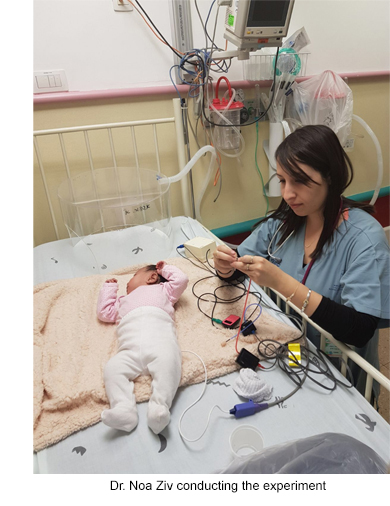page content
Skip page contentMusic for Bronchiolitis
 Research undertaken at Schneider Children's has found a positive link between playing music to infants up to the age of two years with bronchiolitis (inflammation of the airways) and the improvement of vital signs such as the level of oxygen in the blood, pulse rate, respiration rate and so on, which contribute to recovery.
Research undertaken at Schneider Children's has found a positive link between playing music to infants up to the age of two years with bronchiolitis (inflammation of the airways) and the improvement of vital signs such as the level of oxygen in the blood, pulse rate, respiration rate and so on, which contribute to recovery.
Bronchiolitis is frequently caused by the RSV virus, the most common reason for the hospitalization of infants during the winter months. During the first two years of life, all children will be infected with the RSV virus, while some will develop severe bronchiolitis requiring hospitalization (mainly to administer oxygen). Infants who are hospitalized due to bronchiolitis are invariably at increased risk of developing asthma until the age of six.
In the study conducted by Dr. Noa Ziv, senior physician in the Department of Pediatrics "C" at Schneider, 52 hospitalized children with bronchiolitis were divided into three groups. The first group remained in complete silence and represented the control group; the second group heard quiet music; and the third heard Mozart's sonata which proved a positive influence on physiological parameters in older patients. Some 70 recordings were played during the study with each participant being exposed to music for 25 minutes once a day or several times during hospitalization via earphones with controlled volume levels.
The research came about because patients in the third group, including the control group, displayed an improvement in vital signs and were discharged home more rapidly than others with bronchiolitis who were not exposed to music: 60% of the children in the first group, 77% of the children in the second group, and 74% of the children who heard Mozart's sonata, showed improvement in parameters. All the children who participated in the study showed an improvement in oxygen saturation, ate better, were more awake and were cheerful with a better disposition.
Dr. Ziv, head investigator, commented that "during the natural course of the illness, regrettably, other than administering oxygen, monitoring and observation, there is nothing that can contribute towards rapid improvement. Therefore, it was very encouraging to discover in the study we conducted that there is something that can help change children's conditions, and more so when this involves a trivial issue such as music. It was amazing to see how within 25 minutes, we saw such a rapid change in the children which we did not observe in other patients. The significance is that it is the elimination of surrounding noise in the hospital - emanating from monitors, oxygen devices and staff - that leads to the improvement in vital signs. The study is only a small sample of multiple research projects ongoing at Schneider Children's all the time with the objective of giving hope and a better future to children, and I am proud to be a small part of this."




.jpg?BannerID=98)



.jpg?BannerID=97)

.jpg?BannerID=96)